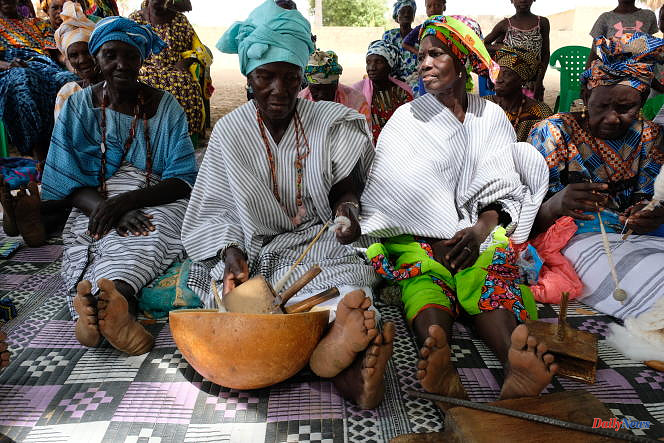The baobabs have become rare along the N1 then the laterite track, and Dakar is only a distant memory when the small hamlet of Fayil appears, on the salty lands of Sine Saloum. In this area located to the southwest of the capital, artisanal cotton spinning has been passed down from mother to daughter for decades. When we arrive, seated on mats under a tree, the spinners are at work, following the ancestral protocol to the letter.
After deseeding, which separates the seeds from the plant fiber using an iron rod supported on a wooden support, they comb the material between two wooden brushes and metal picks to obtain a foamy cotton, it is carding. The fibers obtained are then twisted and stretched on a bobbin to form a fine and resistant thread, the falé. A raw and elegant material, made from organic cotton, grown without irrigation. It is with these untreated skeins that weavers have been making the precious woven loincloths for two centuries that are worn or offered during traditional ceremonies of the Serer community.
After the Wolof and the Fulani, the Serer make up the third ethnic group in Senegal, located in the center-west of the country. These people, among the oldest to settle in the area, had a strict dress code that went hand in hand with a tradition of spinning and weaving.
An artistic craft, precious but fragile. The spinner community is dwindling in the country. Their advanced age and the rural exodus threaten the sustainability of the gesture. In this already 49% urban society, the new generation is turning away from low-wage village life, attracted by the lights of Dakar three hours away. Strong competition from industrial yarn, acclaimed by weavers, because it is purchased spun and a symbol of modernity, has further increased the lack of interest in this gesture. "In twenty years, this tradition risks being lost because there will be no more women with this know-how", is alarmed Jeanne D'arc Sarr, fifty-something from Fayil, trained in these skills in her youth. artisanal. Like her, Marceline Diouf, a 70-year-old spinner who "inherited these gestures from [her] great-grandmothers", now fears a break in the chain of transmission.
"Women's Empowerment"
Aware of this threat, the Senegalese Fatim Soumaré, 34, embarked on a backup operation after a real thunderbolt. It was in December 2020, during a stay in Senegal, her country of birth, that the one who worked for eleven years in the world of finance, in France, discovered the falé and met "these women with know-how extraordinary ". Daughter of a trader and dyer of traditional fabrics, Fatim Soumaré, who admits having always nurtured "a passion for textiles and fibers", decides to radically branch off. Amazed, she put her suitcases in the country and, having become a textile designer, she created, in October 2021, her brand, Falé, which is based on a weaving workshop and aims to set up a collective of craftswomen.
For weeks, the young woman crisscrossed the slopes of Sine Saloum to convince the spinners of around thirty villages to join her project to revalorize and safeguard traditional spinning by the communities. “Some villages refused. In others, there were only a few spinners left too old to engage,” she recalls. However, by dint of patience, she rallies five, who now collaborate with her brand within a collective of two hundred women, including seventy-five at Fayil.
Since ginning and carding are complex and time-consuming, the designer provides the collective with cotton that has already been carded – purchased from Sodefitex, the only cotton company that remains in Senegal – to be spun manually. It takes them about two weeks to produce the thirty spools on which one kilo of the precious thread will be wound. Since its launch in December 2021, the collective has produced 730 kilos of falé, half of the cotton purchased by Fatim Soumaré. Alongside her desire to sanctuary know-how, the entrepreneur wants to "support these women in their empowerment, improve their working conditions and their standard of living".
Since the creation of the Falé collective, Fayil's economic interest group called "Imbetaando cosaan" ("remembering what the grandparents did" in Serer) has generated nearly 4,000 euros in revenue, which has contributed to the development from the community. To consolidate the ecosystem and get women workers out of the informal economy, which still largely prevails in the country, the group recently acquired a legal existence. Progress applauded by Marie-Hélène Sarr, a 69-year-old spinner, proud of the revitalization of the village and the surplus of social cohesion that this has generated. Enough to dream that, tomorrow, young people will also be interested again in this craft and perhaps develop a real industry.
A niche in the textile market
In the southern regions of Senegal, rainfed cotton is grown; it consumes 91% less water than conventional irrigated cultivation. A modest player in West Africa on this market, Senegal is developing excellent quality cotton production that supports more than 50,000 farmers through exports. In the future, women's groups could also cultivate their own fields there to create a complete, ethical and sustainable value chain. It is in any case the will of Fatim Soumaré who loves "this noble, sober and elegant yarn", an organic product, unwashed and unbleached.
In the Falé workshop, located in Djilor Djidiack, an hour and a half from Fayil, the spools are lined up on the shelves next to the skeins in natural ecru and taupe colors. It is in this form that the yarn goes to two resellers in France, because it is generally considered too expensive for the local market, even if a few designers make an exception and are well supplied here. But this is not enough to sell all the work of the collective because, "against all expectations, we have a lot of stock! “, Details the French Laurent Grisel, 46, co-founder of Falé and husband of Fatim Soumaré.
However, nothing says that these stocks will last because the Falé workshop is being transformed into a place of creation. Four young craftsmen trained in weaving are already making cushions and rugs with the precious raw material. These will be on sale in a concept store in Dakar or will go to boutiques in Rennes and Lisbon. Trained in Brittany by a master weaver, Fatim Soumaré also uses Falé as a laboratory. Attracted by the discovery of new materials, she is currently testing the work of rônier vegetable fiber, produced by a craftsman in the region from this West African palm already prized for its sap and sugar. “In fact, there are plenty of incredible traditional techniques that we could bring back to life,” she enthuses, eager to promote the local flora more widely.
For the time being, it still has to secure the downstream of the production chain. A rare product, the falé is sold ten to fifteen times more expensive than a classic cotton and therefore corresponds to a niche in the world textile market, assumes Fatim Soumaré. A natural, traceable and sustainable luxury, "well recognized as such in Europe, but not yet perceived as really precious in Senegal", laments the designer. To advance this awareness on the African continent, she first campaigns for the recognition of the gesture of her craftswomen as an artistic craft.












